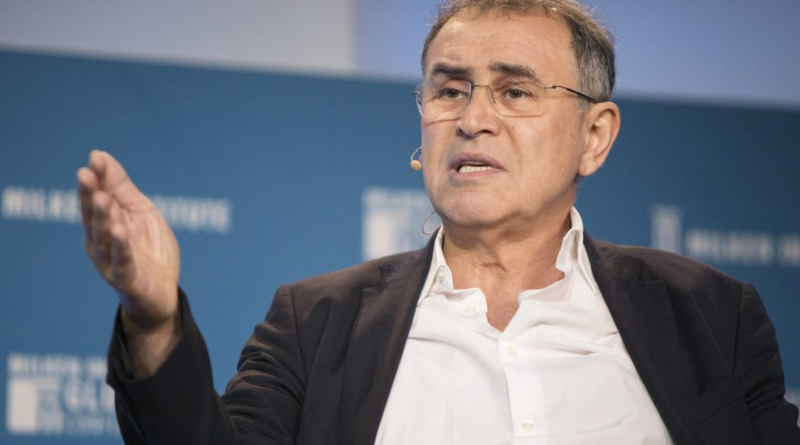‘Dr Doom’ Nouriel Roubini warns the market is in for a ‘megathreatened age’ and investors will lose trillions: ‘This bloodbath is likely to continue’
A host of big names on Wall Street are confident that 2024 will be a good year for the market: most see the S&P 500 rising and mega-cap tech stocks continuing to perform.
But not renowned economist Nouriel Roubini, who has earned himself the title of ‘Dr Doom’ thanks to his gloomy predictions.
Roubini’s latest analysis is in keeping with his usual outlook, with the professor emeritus at New York University saying losses for bondholders and investors is likely to leap into the trillions over the next 10 years.
The economist added the market also needs to be concerned about aging populations, the threat of AI and another global pandemic, as well as a continuation in “de-globalization.”
To round it up, Roubini writes: “There is growing recognition that not only the global economy but also human survival is at risk.”
And while such doomsday predictions may sound like something most likely to be found in a sci-fi novel or dystopian film, the Turkish-Iranian economist has been accurate with his extreme calls before.
In 2006, Roubini told the IMF he believed the U.S. economy was heading for a housing bust and huge recession, the ripple effects of which would be felt across the world.
During that speech audience members were spotted chuckling, reported The New York Times. Two years later the financial crisis of 2008 hit, wiping out nearly $8 trillion in stock market value between late 2007 and 2009.
Roubini isn’t scared to be a lone voice in an echo chamber, but said his concerns about geopolitical and economic tensions are beginning to be picked up by others.
Accepting inflation
One of Roubini’s main concerns is that Fed is likely to bow to pressure and compromise on their target of 2% inflation.
Where other economists are convinced that Jerome Powell is likely to begin to lower rates following a period of pause, Roubini said it is necessary to hold steady.
In an opinion piece on Project Syndicate Roubini wrote that the Fed may be forced to “bend” from its target “to avoid causing an economic downturn and a financial crash.”
“The fact that they have already paused rate hikes despite too-high core inflation (which excludes volatile food and energy prices) suggests that they may be preparing to accept above-target inflation,” the chairman and co-founder of Roubini Global Economics LLC added.
For his part, Fed chairman Jerome Powell has dismissed such theories, saying in November: “We remain strongly committed to bringing inflation back down to our 2% goal… The process of getting inflation sustainably down to 2 percent has a long way to go.”
Expensive problems
Global leaders are also facing down issues which will take deep pockets to rectify, Roubini said.
The economist pointed to the fraying relationship between the West and powers such as China, Russia and Iran—the Russia and Ukrainian conflict, for example, could grow to a point where NATO is forced to step in.
Moreover the Gaza conflict is drawing further divides, with Roubini adding: “Israel’s military operation in Gaza in response to Hamas’s massacre of Israeli civilians on October 7 risks fanning the flames of a broader regional conflict, which would cause another spike in energy prices.”
He continued: “With the U.S., Europe, NATO, and pretty much everyone across the Middle East and Asia re-arming, higher levels of spending on conventional and unconventional weapons (including nuclear, cyber, bio, and chemical) are all but assured.”
Although not everyone may agree with Roubini’s take on the outcome of geopolitical tensions, many agree it’s a huge threat.
JPMorgan Chase CEO Jamie Dimon, for example, has said current tensions are his biggest concern.
“In the U.S. we continue to have a strong economy,” Dimon told the Times earlier this month. “We still have a lot of fiscal and monetary stimulus in the system. But these geopolitical matters are very serious—arguably the most serious since 1938.”
The bloodbath continues
Given the extraordinary circumstances of the pandemic Roubini said the market has been operating in an “everything bubble” when “monetary, fiscal, and credit easing inflated the valuations of just about everything.”
This impacted not just speculative assets such as crypto and meme stocks but also safer assets such as government bonds, which had investors doing U-turns after having turned their back on the traditionally reliable asset.
“This bloodbath is likely to continue,” wrote Roubini. “Globally, losses for bondholders and equity investors alike could grow into the tens of trillions of dollars over the next decade.”
But the economist did see some light at the end of the tunnel if humanity was able to navigate “megathreats”—such as AI, geopolitical tensions and social change.
“The future could be bright if we can avert a dystopian scenario in which megathreats destructively feed on each other,” wrote Roubini. “Our first priority will be to survive the next few decades of instability and chaos.”



